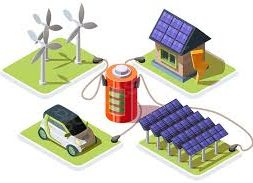
In Short : Tamil Nadu has achieved a major renewable energy milestone as wind and solar power together supplied the majority of the state’s electricity demand. The achievement highlights the state’s leadership in clean energy adoption and grid integration. By meeting most of its demand through renewables, Tamil Nadu sets an example for other states pursuing sustainable power transitions.
In Detail : Tamil Nadu has marked a significant achievement in the renewable energy sector by meeting the majority of its electricity demand through wind and solar power. This milestone reflects the state’s strong commitment to clean energy and its growing ability to integrate renewable sources into its power grid effectively.
The development highlights Tamil Nadu’s position as a renewable energy leader in India. With vast wind and solar resources, the state has consistently invested in infrastructure that supports a sustainable energy mix. This achievement also demonstrates progress toward India’s broader clean energy goals.
Over the past decade, Tamil Nadu has steadily increased its renewable capacity, particularly in wind energy. Seasonal wind generation has been a key contributor to stabilizing the state’s grid, reducing dependence on fossil fuels. Solar installations have also played a crucial role in balancing the energy supply.
Industry experts believe this success is a result of proactive state policies and strong investor interest. By encouraging renewable adoption, Tamil Nadu has been able to expand its generation capacity while creating opportunities for private developers. This has ensured consistent growth in clean energy deployment.
The achievement is also important for environmental sustainability. By shifting to renewable power, Tamil Nadu has reduced its reliance on coal and other carbon-intensive sources. This step contributes to lowering greenhouse gas emissions and supports India’s climate commitments.
Consumers in the state are benefiting from a cleaner and more reliable power supply. The increasing share of renewables is also expected to keep electricity costs stable in the long run. With storage solutions gaining traction, the reliability of renewable power is set to improve further.
Experts point out that grid integration has been one of the biggest challenges in renewable expansion. However, Tamil Nadu has successfully managed variability through effective forecasting and scheduling. This has allowed renewable energy to play a dominant role without disruptions.
The state’s progress serves as a model for other regions aiming to scale up clean energy. By aligning policy, infrastructure, and investments, Tamil Nadu has shown how renewable energy can become the backbone of electricity supply. This achievement is likely to inspire similar strategies across India.
Looking ahead, Tamil Nadu is expected to further expand its renewable capacity with upcoming solar and hybrid projects. With continued government support and innovation in energy storage, the state could strengthen its leadership in clean power, paving the way for a greener and more resilient future.











